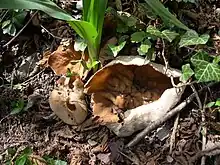Disciotis
Disciotis is a genus of fungi in the family Morchellaceae. Members of this family, characterized by their cup- or bowl-shaped apothecia, have a widespread distribution, especially in northern temperate regions.[1]
| Disciotis | |
|---|---|
 | |
| Disciotis venosa | |
| Scientific classification | |
| Kingdom: | |
| Division: | |
| Class: | |
| Order: | |
| Family: | |
| Genus: | Disciotis Boud. (1885) |
| Type species | |
| Disciotis venosa (Pers.) Arnould | |
Description
Disciotis has a cupulate (cup-shaped) pileus with vein-like hymenial folds and a small to non-existent stipe.[2]
Species
The type species is Disciotis venosa, originally described as Peziza venosa by Christian Hendrik Persoon in 1801. Other species described in the genus include:
- Disciotis ferruginascens Boud. (
- Disciotis maturescens Boud. (1891)
- Disciotis rufescens R. Heim (1934)
It has been suggested that these species (and variants not listed above) all represent a single, morphologically variable species.[3]
There is confusion about the names but the genus also includes these species:
References
- Bisby, Guy Richard; Ainsworth, G. C.; Kirk, P. M.; Aptroot, André (2001). Ainsworth & Bisby's Dictionary of the fungi / by P. M. Kirk... [et al.]; with the assistance of A. Aptroot... [et al.] Oxon: CAB International. p. 161. ISBN 0-85199-377-X.
- Bunyard BA, Nicholson MS, Royse DJ. (1995). Phylogenetic resolution of Morchella, Verpa, and Disciotis (Pezizales: Morchellaceae) based on restriction enzyme analysis of the 28S ribosomal RNA gene. Experimental Mycology 19 (3): 223–33.
- Korf RP. (1972). Synoptic Key to the Genera of the Pezizales. Mycologia 64(5): 937–94.
External links
This article is issued from Wikipedia. The text is licensed under Creative Commons - Attribution - Sharealike. Additional terms may apply for the media files.